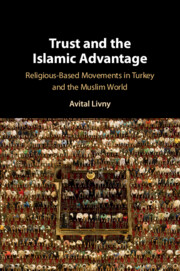9 - Conclusion
from Part III - Theoretical Development
Published online by Cambridge University Press: 31 August 2020
Summary
The conclusion begins by exploring questions of internal and external validity. In the latter case, the concept of religious group identity is applied to faiths other than Islam and is found to extend to other egalitarian faiths, including Judaism and Buddhism. In addition, cross-national data on vote volatility confirm that the trust problem invoter coordination extends beyond the Turkish case. Delving into some out-of-sample predictions, I consider where in the Muslim worldIslamic groups might be particularly successful, based on a combination of low trust and salient Islamic identity. I also explorewhat mightexplain the strange combination of low trust and high honesty in Muslim countries. To address this trust deficit, I suggest that over-bearing institutions may play a key role in not allowing citizens to learn who among them can really be trusted. Finally, I consider what factors from within my theory could explain the eventual decline of Islamic-based groups, in Turkey and elsewhere, before posing some questions for future lines of inquiry.
Keywords
- Type
- Chapter
- Information
- Trust and the Islamic AdvantageReligious-Based Movements in Turkey and the Muslim World, pp. 209 - 221Publisher: Cambridge University PressPrint publication year: 2020

